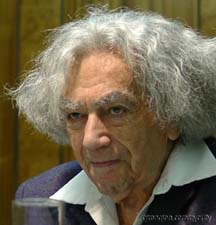By Zsuzsa Lukács
 “HIS persona was more than just radiant and glowing; it was magical,” says Bob Schulz, film director and bosom buddy of the late György Faludy.
“HIS persona was more than just radiant and glowing; it was magical,” says Bob Schulz, film director and bosom buddy of the late György Faludy.
He can precisely recall the moment when he was overtaken by Faludy’s mesmerizing interpretation of the French medieval ballads of Francois Villon at the age of 15. It is then that he came under the spell of the Hungarian writer. For Schulz, Faludy was the ideal incarnation of the ultimate idol. His awe did not cease; in fact, it intensified over the years, culminating in the ’70s in a personal adaptation and interpretation of Faludy’s Ave Luna, a poem written with wit, wonder and a disturbing insight into the diabolic motives behind the first momentous expedition to the moon.
For Schulz, this was an ecstatic era in his life, since he partook in a project that allowed Faludy to see, for the first time, the images his poems create in other people’s minds. This project was not only intimate, but also novel, since it happens rarely that poems inspire directors. According to Schulz, Faludy’s talent as an artist lay in his depth, and the way he interpreted the world. He had the potency to narrate distant historical facts so realistically, as if they had occurred only the day before.
…..
For Schulz, Faludy represents the cobble stone leading to meekness, fame and perfection, and he confesses that his mission in life is still to emulate the life of his close friend. Multiple Hungarian artists, who had fled to North America during the 1956 revolution, failed to establish themselves.
Antithetically, sympathizers, who had taken him into their patronage, instantaneously assisted an enlightened and charismatic Faludy. He owed many successes to the patronage of writers and producers like George Jonas, Ibi Gabory, and Schulz.
This patronage and respect grew to cultism over the years.
….
GYÖRGY Faludy, the poet, writer, translator and legend here in Hungary, would have been 96-years-old on Sep 22.
He was buried last Saturday, alongside other Hungarian literary greats, at the cemetery on Budapest’s Fiumei út, with relatives, friends, leading politicians, and admirers in attendance.
Born into a Jewish family, Faludy went to school in the Fasori Evangélikus Gimnázium and studied at universities in Vienna, Berlin and Graz.
At the age of 24, his original interpretation of the French medieval ballads of Francois Villon brought him huge popularity, expressing a great love for freedom just before the rise of Nazi power in Europe.
In 1938, Faludy left for Paris, but moved to Algeria after the Nazi occupation of France, and from there to the United States in 1941, where he joined the US Army.
The poet returned to Hungary in 1946, when he started work for the editorial board of Népszava (Voice of the People), the daily newspaper of the Social Democrats, but in 1949 he was falsely accused of being a CIA agent and sent to the forced labor camp in Recsk.
There he lectured other prisoners in literature, history and philosophy. Faludy was later pardoned and released shortly before the Hungarian Uprising in 1956. After the suppression of the revolution he escaped to England via Vienna and a brief sojourn in Paris. In London, Faludy, who became a British subject, was the editor of the Hungarian literary journal Irodalmi újság, and it was there that he wrote the novel My Happy Days in Hell in English (the book was first published in Hungarian in 1987 only), for which Faludy is still best known outside Hungary.
The book, which in many ways anticipated Alexander Solzhenitsin’s Gulag Archipelago by a decade, is the story of his life as an émigré poet in Europe under Hitler and Stalin. In 1967, Faludy moved to Canada, where he lived for the next 20 years. He gave lectures in Canada and the US and edited Hungarian literary journals. In 1976, he received Canadian citizenship and, shortly after, was given an honorary doctorate of Toronto University, where he taught regularly. In 1988, after more than 30 years in exile, Faludy came back to Hungary, where he received a very warm and enthusiastic welcome.
His works, which were previously forbidden, confiscated and destroyed, were published in Hungary after the collapse of Communism. Once nominated for the Nobel Prize for Literature, Faludy later received the most prestigious literary award in Hungary, the Kossuth Prize. Faludy is survived by his third wife Fanni, and Andrew, his son by his second wife.
